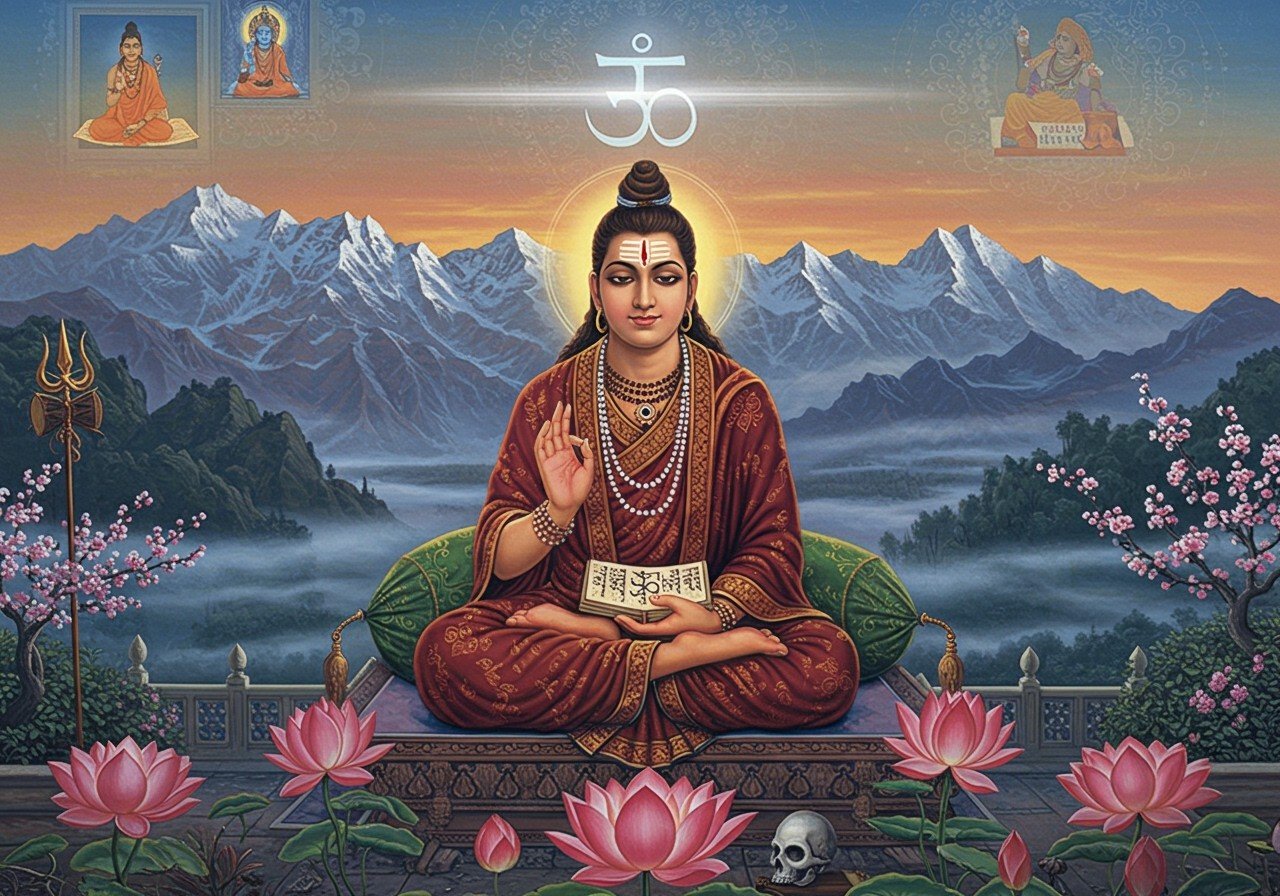
Abhinavagupta (c. 950 – 1016 CE) stands as a towering figure in Kashmir Shaivism, a non-dualistic tradition within Hindu philosophy. His profound insights into the nature of consciousness, aesthetics, and spiritual practice continue to resonate with seekers today. During his lifetime, Kashmir flourished as a center of learning and spiritual exploration, nurturing a rich tapestry of philosophical and religious thought.
Life and Lineage
Born into a scholarly family, Abhinavagupta’s intellectual and spiritual development was nurtured from a young age. His father, Narasimhagupta, and mother, Vimalā, instilled in him a deep appreciation for knowledge and spiritual pursuits. This foundation laid the groundwork for his prolific career as a philosopher, mystic, and aesthetician. His education was extensive, encompassing not only philosophy but also linguistics, music, and the arts, making him a true polymath of his time. Under the guidance of esteemed gurus like Shambhunatha, he delved into the intricacies of Kashmir Shaivism, particularly the Pratyabhijna (Recognition) school, which emphasizes the inherent divinity within each individual.
Key Contributions to Kashmir Shaivism
-
Synthesis of Teachings: Abhinavagupta masterfully integrated the diverse teachings of earlier Kashmir Shaivism scholars. He clarified complex concepts like nondualism (Advaita) and monism, making them accessible to a wider audience and solidifying the philosophical foundation of the tradition.
-
Tantrāloka: This magnum opus, comprising over 6,700 verses, is considered his most significant work. It serves as a comprehensive guide to the philosophical and practical aspects of Kaula and Trika, two important streams within Kashmir Shaivism. The Tantrāloka explores the nature of reality, states of consciousness, paths to liberation, and the intricacies of ritualistic practices.
Explore our collection of sacred texts and ritual items, including resources related to Tantrāloka and Kashmir Shaivism at poojn.in.
-
Spanda: Central to Abhinavagupta’s philosophy is the concept of Spanda, the divine pulsation or vibration that underlies all of creation. He described Spanda as the dynamic interplay between consciousness (Shiva) and energy (Shakti), the fundamental forces that animate the universe. This dynamic is essential to understanding the nature of reality within Kashmir Shaivism.
-
Pratyabhijna (Recognition) School: A staunch advocate of the Pratyabhijna school, Abhinavagupta emphasized the importance of recognizing one’s inherent divine nature. This school posits that Shiva, the individual soul, and the universe are ultimately one, and liberation comes through the realization of this unity. Recognizing this truth is the pathway to spiritual liberation.
-
Trika System: The Tantrāloka also serves as a comprehensive manual for the Trika system of Kashmir Shaivism. This system emphasizes the interplay of will (icchā), knowledge (jñāna), and action (kriyā) as fundamental aspects of the divine and the path to enlightenment. Abhinavagupta’s work provides a balanced and nuanced understanding of these three forces.
Deepen your understanding of the Trika system with authentic Yantras and Mantra tools available at poojn.in.
Other Notable Works and Contributions
-
Abhinavabhāratī: This insightful commentary on Bharata Muni’s Nāṭyaśāstra, an ancient treatise on drama, explores the theory of rasa (aesthetic experience of emotions). Abhinavagupta’s contribution to aesthetics is highly regarded, offering profound insights into the interplay of art, beauty, and spiritual experience. He connected artistic expression with the deeper dimensions of human consciousness.
-
Commentaries: Beyond the Nāṭyaśāstra, Abhinavagupta wrote commentaries on various other significant works, including those of Kalidasa and Anandavardhana. His commentaries are valued for clarifying and expanding upon the original texts, providing a richer understanding for later generations of scholars.
-
Systematization of Knowledge: He meticulously organized and systematized philosophical knowledge, drawing from diverse sources to create a more coherent and accessible framework for understanding complex spiritual concepts. This work was crucial for preserving and transmitting the wisdom of Kashmir Shaivism.
-
Emphasis on Experience: Abhinavagupta emphasized the importance of direct experience (pratyaksha) as a pathway to realizing the supreme truth of Shiva. He highlighted the role of the senses, worldly phenomena, and objective experience in the process of self-discovery and spiritual realization, integrating the mundane with the divine.
Poojn.in: Supporting Your Spiritual Journey
At poojn.in, we offer a wide selection of products to support your exploration of Kashmir Shaivism and the teachings of Abhinavagupta. Discover sacred texts, ritual items, meditation supplies, and more. Visit www.poojn.in to browse our collection and enhance your spiritual practice.
Enduring Legacy
Abhinavagupta’s profound teachings continue to inspire and guide spiritual seekers today. His works are studied by scholars and practitioners of Shaiva philosophy worldwide, and his insights into consciousness, aesthetics, and spiritual practice remain remarkably relevant in the modern world. He reminds us that cosmic consciousness is our birthright, a potential waiting to be realized within each of us.
Explore more about Shankaracharya Temple with our comprehensive guides: A Complete Guide and Spiritual Heart of Kashmir. Also, delve deeper into related concepts like Shakti Peethas and Navadurga here and the interconnected journey of Karma, Reincarnation, and Dharma here. Find exquisite Murtis of Lord Shiva and Adiyogi at poojn.in, poojn.in, poojn.in, and poojn.in.


